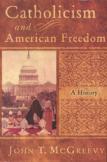A Church Aloof or Engaged?
This study seeks to synchronize intellectual developments in American Catholicism with parallel events abroad and to examine how an international conversation among Catholic thinkers sought to influence the church’s dialogue with the modern Western world. Most importantly, John McGreevy stresses that this dialogue has been as demanding that secular society adjust to Catholicism as it has been demanding that the church adjust to secular society. This is a vital corrective, because historical studies of this relationship have often placed all the burden of adjustment on the church.
The intellectual conversation across the Atlantic has been an intimate one since the middle of the 19th century, when Catholics in both the United States and Europe faced challenges to their religious liberty from various forms of political liberalism. In the United States, Protestant abolitionists paradoxically tried both to end slavery and to undermine Catholic worship. McGreevy, the John A. O’Brien Associate Professor of History at the University of Notre Dame, highlights Boston’s Eliot School Rebellion of 1859, in which a Catholic family lost a lawsuit against a city that had refused to allow their schoolchild to excuse himself from reading aloud from the King James Bible and the Protestant version of the Ten Commandments. Meanwhile, a more secular and pernicious form of liberalism in Europe had driven many conservative clerics, like the Swiss Jesuit Bernardine Wiget, to flee literally for their lives to the United States, especially after the multiple revolutions of 1848. These refugees brought with them the full spiritual vigor of the ultramontane movement along with Pope Pius IX’s skepticism toward the nonconfessional state.
The result was a church that valued community more than individual autonomy, and that regarded liberty as the freedom to choose one absolute truth rather than one’s personal choice among a variety of contingent truths. Both perspectives have created tension between the church and Western secular culture.
McGreevy’s theme is that Catholic intellectuals have striven more to balance the values of church and society than to have one cancel out the other. The church attempts to approach modern life through two models. One values authoritarian ways of making decisions and tends to hold the church aloof from the world around it. The other calls for more participation in decision making and tends to insert the church in the greater world. However, most of the scholars McGreevy surveys showed clear signs of valuing both models. The liberal American convert Orestes Brownson, for example, saw abolitionism as fully compatible with Catholicism and believed that doctrinal definitions were reformable, but thought that ultramontane governance could best accomplish such reform. John Ford, a leading defender of the traditional ban on contraception, condemned the Allied saturation bombings of World War II. There are many other examples in this book, and they prove that the Catholic belief in an absolute truth is not a belief in a simplistic one. What seems to link all approaches is a fear that human authority will reach beyond its competence, which would necessitate restraint by an objective standard.
The author shows that American intellectuals have been comfortable with complexity because of their engaging conversations with overseas counterparts. John Courtney Murray’s idea that the church’s views on religious liberty were historically conditioned owed much to Jacques Maritain and other “Nouvelle Théologie” scholars in France, who weaned the church from classicist ideas of doctrinal presentation. In every way, the American church is a citizen of the global church--an important refutation of the charge that its scandals result from the isolation and eccentricity of the United States.
McGreevy’s thesis demands re-examination of the American Catholic experience before the Irish famine of 1845, an era that he unwisely downplays. Prior to the famine, the U.S. church was less dominated by Irish ethnicity than was the case after 1845. Catholics of the Revolutionary and early federal eras are sometimes presented as having had just enough time to imbibe the American proposition before an ultramontane Rome emerged to curb their openness. But McGreevy’s evidence suggests that far from being stifled, American Catholic thought was richly engaged by the revival of the European church.
Ironically, however, McGreevy himself sometimes proves too Eurocentric. For example, he does not offer a full description of the influence of Latin American theology on the United States after 1965. He briefly mentions that liberation theology strengthened Catholic opposition to abortion in North America. He attributes this connection to the large number of Americans who discovered participation in Christian base communities, with their insistence that the church must act against unjust social structures rather than just distribute alms. More details are needed, however, on the link that key liberationists like Gustavo Gutiérrez drew between aggressive capitalism and efforts at population control. They saw the endorsement of abortion and contraception as attempts by the developed world to reduce the demands of the developing world upon the world’s resources. It was yet another example of human authority exceeding its competence.
McGreevy probably felt compelled to end with the sexual abuse crisis. Already the event is too great to ignore; it is also too early to measure its enduring impact. It is not yet ripe for historical analysis. The book, however, is predictive of how the process of addressing this problem will unfold. Discussions will be international in character, will include insights from both the church and secular society and will eventually be likely to produce an antidote that balances authoritarian and participatory models of church. It will also be a solution that holds in tension the church’s aloofness from the world with its engagement of it, for such has been the perennial intellectual product of American Catholicism.
This article also appeared in print, under the headline “A Church Aloof or Engaged?,” in the July 21, 2003, issue.








